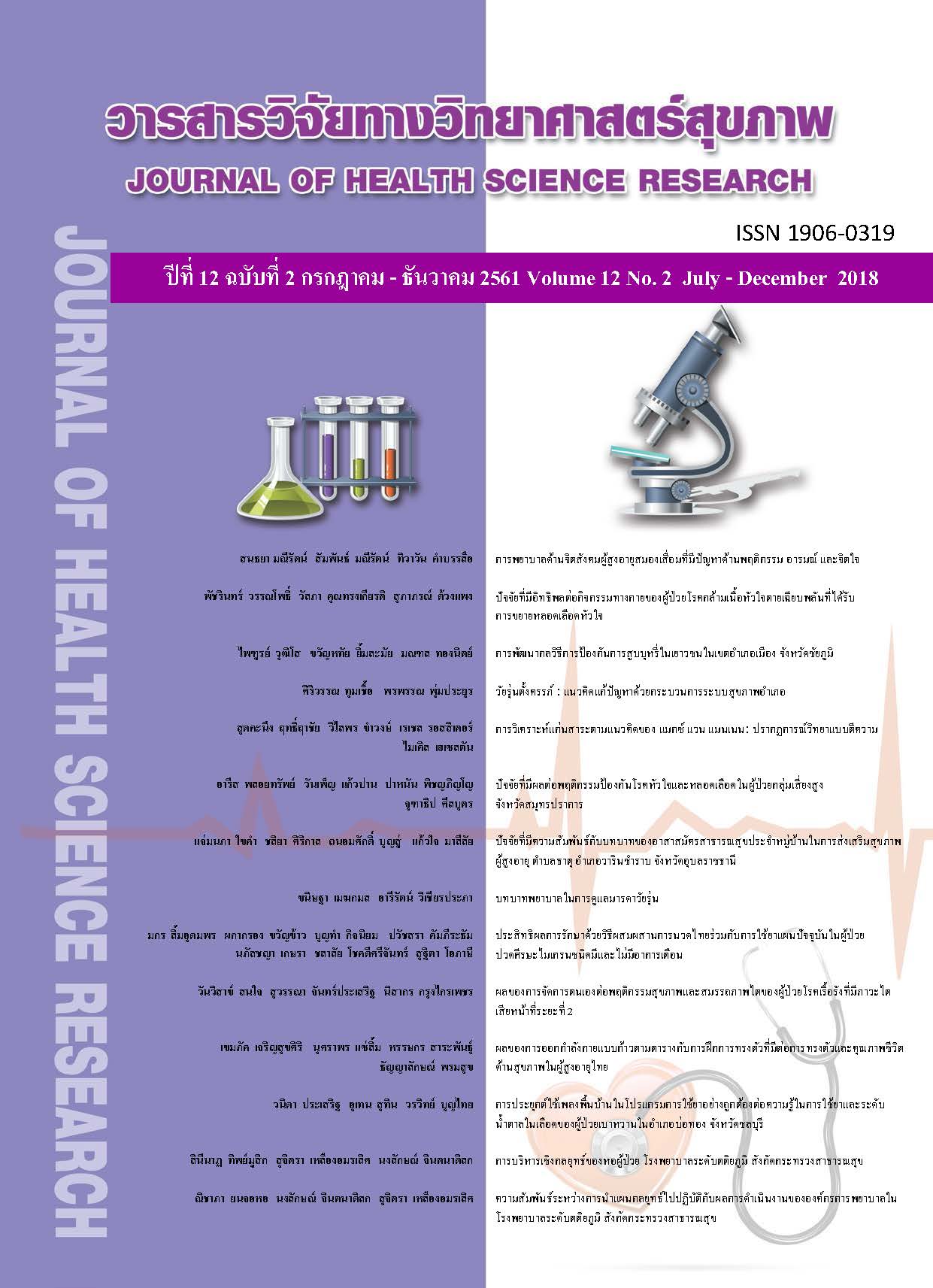การประยุกต์ใช้เพลงพื้นบ้านในโปรแกรมการใช้ยาอย่างถูกต้องต่อความรู้ในการใช้ยา และระดับน้ำตาลในเลือดของผู้ป่วยเบาหวานในอำเภอบ่อทอง จังหวัดชลบุรี
Main Article Content
บทคัดย่อ
การใช้ยาอย่างไม่ถูกต้อง เป็นปัญหาสำคัญในผู้ป่วยโรคเรื้อรัง โดยเฉพาะผู้ป่วยเบาหวาน นำมาซึ่งการเกิดอาการไม่พึงประสงค์จากยาได้ การวิจัยครั้งนี้มีวัตถุประสงค์เพื่อศึกษาผลของโปรแกรมการให้ความรู้ในการใช้ยาอย่างถูกต้องโดยการประยุกต์ใช้เพลงพื้นบ้านต่อความรู้ในการใช้ยาและระดับน้ำตาลในเลือดของผู้ป่วยเบาหวาน เป็นการวิจัยกึ่งทดลองแบบสองกลุ่มวัดก่อนและหลัง กลุ่มตัวอย่าง คือ ผู้ป่วยเบาหวานจากโรงพยาบาลส่งเสริมสุขภาพตำบลในเขตอำเภอบ่อทอง จังหวัดชลบุรี จำนวน 104 คน ได้มาจากการสุ่มอย่างง่าย เครื่องมือที่ใช้ในการวิจัย ได้แก่ โปรแกรมการใช้ยาอย่างถูกต้อง และแบบสอบถามความรู้เกี่ยวกับการใช้ยาอย่างถูกต้อง วิเคราะห์ข้อมูลด้วยสถิติเชิงพรรณนา และ Independent–sample t-test
ผลการวิจัย พบว่า หลังการทดลอง คะแนนเฉลี่ยความรู้ในการใช้ยาอย่างถูกต้องของกลุ่มทดลองสูงกว่ากลุ่มควบคุม และระดับน้ำตาลในเลือดลดลงกว่ากลุ่มควบคุมอย่างมีนัยสำคัญทางสถิติ (p < .05) การศึกษานี้มีข้อเสนอแนะ บุคลากรทางการแพทย์ควรประยุกต์ใช้โปรแกรมนี้เพื่อส่งเสริมการใช้ยาอย่างถูกต้อง และหลีกเลี่ยงการเกิดอาการไม่พึงประสงค์จากการใช้ยาในผู้ป่วยเบาหวานได้
Downloads
Article Details
บทความที่ได้รับการตีพิมพ์เป็นลิขสิทธิ์ของวิทยาลัยพยาบาลบรมราชชนนี จังหวัดนนทบุรี
ข้อความที่ปรากฏในบทความแต่ละเรื่องในวารสารวิชาการเล่มนี้เป็นความคิดเห็นส่วนตัวของผู้เขียนแต่ละท่านไม่เกี่ยวข้องกับวิทยาลัยพยาบาลบรมราชชนนี จังหวัดนนทบุรี และคณาจารย์ท่านอื่น ในวิทยาลัยฯ แต่อย่างใด ความรับผิดชอบองค์ประกอบทั้งหมดของบทความแต่ละเรื่องเป็นของผู้เขียนแต่ละท่าน หากมีความผิดพลาดใด ๆ ผู้เขียนแต่ละท่านจะรับผิดชอบบทความของตนเองแต่ผู้เดียว
เอกสารอ้างอิง
2.Wild S, Roglic G, Green A, Sicree R, King H. Global prevalence of diabetes: Estimates for the year 2000 and projections for 2030. Diabetes Care. 2004; 27(5): 1047-53.
3.Chapter 2: The global burden.In:Guariguata L, Nolan T, Beagley J, Linnenkamp U, Jacqmain O, editors. IDF Diabetes Atlas. 6thed. Brussels, Belgium: International Diabetes Federation; 2013. p. 29-49.
4.The Bureau of Non-Communicable Disease, Department of Disease Control, Ministry of Public Health. The information of non-communicable disease [Internet]. 2015 [cited 2015 Oct 10]; Available from: http://thaincd.com/information-statistic/non-communicable-disease-data.php. (in Thai).
5.Deerochanawong C, Ferrario A. Diabetes management in Thailand: A literature review of the burden, costs, and outcomes. Global Health. 2013;9:11.doi: 10.1186/1744-8603-9-11.
6.Poonsawas Y. The outcomes of empowerment program for village health volunteers in home medication usage amongst the elderly with chronic illnesses in Ratchaburi Province [Thesis]. Nakhon Pathom: Christian University of Thailand; 2014. (in Thai).
7.Health Information Center in Chonburi Province. Health Information [Internet]. 2015 [cited 2015 Mar 25]; Available from: http://data.cbo.moph.go.th/ (in Thai).
8.Bothong Hospital, Chonburi Province. The evaluation of the organization competency. Chonburi: Health Strategy Development Department, Bothong Hospital; 2015. (in Thai).
9.Bandura A. Self-efficacy: The exercise of control. New York, NY: W.H. Freeman and Company; 1997.
10.Khongruangrat Y, Vannarit T, Lukkahatai N. Effect of Fawn Mor Lum Klorn exercise on hemoglobin A1C level among persons with type 2 diabetes. Nursing Journal. 2012;39(3):105-16. (in Thai).
11.Lemeshow S, Hosmer DW, Klar J, Lwanga SK. Adequacy of sample size in health studies. New York, NY: Wiley&Son; 1990.
12.Prombutr P, Sookpool A, PhinyoK, PhinyoP. The effect of self-efficacy program toward knowledge and self-efficacy of village health volunteers in diabetic and hypertension patient care in community in Northeast Province. Songklanagarind Journal of Nursing. 2015; 35(2):113-28. (in Thai).
13.Bloom BS. Handbook on formative and summative evaluation of student learning. New York, NY: McGraw-Hill; 1971.
14.Tan S. Misuses of KR-20 and Cronbach’s alpha reliability coefficients. Education and Science. 2009; 34(152):101-12.
15.Chongtrakul P. RDU hospital: The pathway to rational drug use. Thai Journal of Pharmacology. 2015; 37(1):41-62. (in Thai).
16.Diabetes Association of Thailand under the Patronage of Her Royal Highness Princess Maha Chakir Sirindhorn. Clinical practice recommendation on diabetic disease 2014. Bangkok: Srimeuang Publishing; 2014. (in Thai).
17.Polruk R, Kongin W, Manasurakan J. The effect of self-efficacy enhancement program on Insulin-penfill injection competency [Thesis]. Songkhla: Prince of Songkla University; 2014. (in Thai).
18.Piman W, Sukarnaknun P. Medicine use for diabetic patients. Thai Pharmaceutical and Health Science Journal. 2008;3(1):169-79. (in Thai).
19.Rittiruang A, Piphatvanitcha N, Jullamate P. The effect of the Noraprayuk exercise program applying self-efficacy and social support on glycosylate hemoglobin level among older adults with type 2 diabetes mellitus. Songklanagarind Journal of Nursing. 2015;36(1):179-99. (in Thai).
20.Meebunmak Y, Srisaket J, Phokwang W, Homnan K. A systematic review on health care programs for older adults with diabetes mellitus. Nursing Journal of the Ministry of Public Health. 2017;27(Special):72-89. (in Thai).


